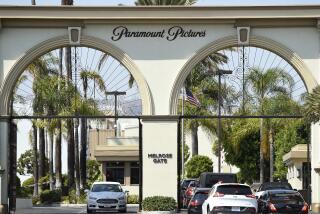Actor Must Pay Studios for Sharing Film Copies
- Share via
Sending a message to Tinseltown insiders during the movie awards season, a judge has told an actor to pay a record penalty for giving an acquaintance promotional DVDs that landed on the Internet.
Two default judgments, recently handed down by U.S. District Judge Stephen V. Wilson, order Carmine Caridi to pay more than $600,000 in damages and attorney’s fees to Sony Corp.’s Columbia Pictures and Time Warner Inc.’s Warner Bros. studios, which sued Caridi in January. The penalty is the maximum under federal law.
It sent “a clear message that the law will deal swiftly and sternly with anyone who violates the intellectual property rights of others,” said Zazi Pope, senior vice president for Warner Bros. Entertainment Inc. “We very much hope this judgment will have a deterrent effect.”
Sony declined to comment.
Studio sources acknowledged that Sony and Warner Bros. were unlikely to collect much from the ailing 70-year-old actor. But, they said, the rulings probably would put a chill on the sharing of coveted “screeners,” promotional DVDs that can provide pirates pristine copies of acclaimed pictures.
The judgments against Caridi came near the end of an unprecedented year of activity against movie piracy. Dozens of illegal DVD replication plants have been raided and shut down, hundreds of people have been charged with movie piracy and the studios have sued hundreds for illegal movie downloading.
In December 2002, copies of the Warner Bros. films “The Last Samurai” and “Mystic River” and of Sony’s “Something’s Gotta Give” and “Big Fish” were found on the Internet. The FBI began an investigation.
The movie studios already had put watermarks on the screeners sent to people who vote for film awards. Last year, the Academy of Motion Picture Arts and Sciences required all members to sign an agreement not to share their screeners with anyone else.
The FBI traced the Warner Bros. and Sony screeners to Caridi, best known for his roles as a Mafioso sidekick in “The Godfather Part III” and “Bugsy.”
Caridi admitted to sending his screeners to Russell Sprague, an acquaintance in Chicago. Sprague, whom the FBI said put copies of the movies online, pleaded guilty to copyright infringement. He is scheduled to be sentenced next month.
Caridi, who wasn’t criminally charged, failed to respond to the civil lawsuits filed against him, and they entered default in April.
In a telephone interview, Caridi said he didn’t have enough money to pay for a lawyer. He rents an apartment in West Hollywood, lives off of his pensions and has a swollen vein condition in his legs and severe back problems.
“I gave the videos to someone who put it on the Internet without my knowledge,” Caridi said. “If I would’ve known that he was going to do that, I would have never sent them to him. I feel the only thing I did wrong was dishonoring the pact I had with the academy by giving the screener to another person.
“I got my punishment from them -- they kicked me out after 22 years.”
After receiving complaints about the written agreements members were forced to sign, the academy won’t ask them to do so this year.
Executives at the major studios have been divided into two camps over how to protect screeners: Some believe the threat of punishment should be enough; others want to employ new technology to prevent screeners from being copied.
The academy endorsed a new type of copy-resistant DVD from Cinea, a subsidiary of Dolby Laboratories, that would play only on customized DVD players that would be provided to academy members. But Cinea’s players aren’t ready yet.
More to Read
The biggest entertainment stories
Get our big stories about Hollywood, film, television, music, arts, culture and more right in your inbox as soon as they publish.
You may occasionally receive promotional content from the Los Angeles Times.











